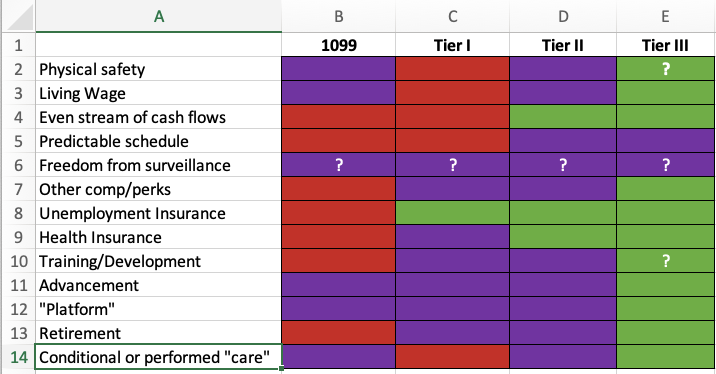Warm Take: Manual transmission. March 14, 2021

This is a liminal moment, and I don’t mean (just) the pandemic. We’re also debating who deserves to be paid enough to meet their basic needs. Who is entitled to be safe at work and beyond — who has a right to health?
And I love Movies About Work as a gateway to robust discussion about who gets to be fully human at work.
So when I saw that Boots Riley would be in conversation with the director of Lapsis, Noah Hutton, I signed right up. And then, I watched Lapsis.
Lapsis takes aim at the gamification of labor, the ways in which tech monopolies have exploited the dreams of self-sufficiency sought by independent contractors in order to strip away basic protections and push workers to their limits.
Noah Hutton, What a Feminist, Anti-Colonial Science Lab Taught Me About Ethical Filmmaking at Talkhouse
I loved it.
In conversation with Riley, Hutton mentioned that his team had created a handbook. It sounded like a sort of constitution to articulate their shared values, and how they’ll act to make films in alignment with their values.
WHAAAT? Boots Riley took a note, and so did I.
Couple 3’s Filmmaking Handbook is inspired by their collaboration with CLEAR, a feminist, anti-colonial science lab. The CLEAR Lab Book articulates CLEAR’s “values, guidelines and protocols.”
Both are elegant documents, written by practitioners who seek to create equitable and humane workplaces. And they’re living documents, meant to be revisited and revised with experience. They’re, dare I say, innovative.
5 or 6 years ago, a mid-career designer told me that she never wanted to hear another 28-year-old manager announce that he had read a “sh!tty Medium article” about a Management Innovation. Which their team would now implement.
This designer comes to mind whenever someone asks me about so-called innovations. (Holocracy, radical candor, nudges…)
“Will this work?” is usually a key question. Yes. Anything can work, I usually say, if everyone agrees to it. Yet agreement doesn’t mean that something is good. Agreement is also a vector of fascism.
My armchair observation/hypothesis about organizations with sustained, non-standard management practices is that they’re usually:
- closely held
- led by a founder or owner committed to enacting the practices
- in a unique position of market dominance
- and, the number of workers in the organization is usually less than a low-integer multiple of Dunbar’s number.
Conditions matter. Someone else’s process may not be repeatable in your organization, today. Or ever.
This is my Warm Take on these handbooks, not a full-on analysis. So I want to highlight a couple of things I appreciate.
It’s been my experience that all management practices require active, visible participation from those who hold positional power, and more so when they aim to change the status quo. These handbooks acknowledge the presence of inherent power dynamics, even in organizations that seek to work differently.
I like that these organizations describe their shared values, and share process for identifying and working with these values. Though I have some caveats.
Many statements of so-called values are high-minded and non-specific. There’s a lot of wiggle room in “Don’t be evil.”
Leaders must be in constant conversation and negotiation with what it means, practically, to hold a value. “We’re not evil, so we don’t hire contractors to do the same job as a W-2 employee who earns a higher salary and receives benefits.”
Couple 3 and CLEAR are clear about the actions and behaviors that embody and produce their values. This step is often missed, particularly in early-stage organizations. Thumbs up.
I am also interested the facilitation process used to to elicit and articulate shared values. Simply, people tell stories about their experiences in the organization. Discussion is used to draw out the values expressed in people’s lived experience, and elaborate on them.
Couple 3’s handbook says,“These values are not aspirational but instead already latent in the social relations and practices of our group, which makes them possible to build upon.” (Emphasis mine.)
Yes, you want to build upon some latent values. And, established organizations frequently have some latent values that should be demolished.
Another story. A young manager once told me that nobody in their company gave or received direct feedback. Instead, people sniped about others behind their backs. If I recall correctly, their corporate values were painted on the lobby walls.
I asked, “So, is one of your values, ‘Complain about someone in the kitchen, and hope they’ll hear about it and change’?” My blunt statement was so absurd that we both laughed. But really, how awful. And it becomes part of the environment; it generates stories.
Other latent values get expressed through crisis. Events like massive layoffs, a wholesale management change, or exposure of a culture of harassment. These experiences can be shattering for people, and become plot points in people’s stories.
For a storytelling exercise to be fruitful, facilitated discussion must respect all latent values. So, people must be willing to speak — and hear — the inspiring stories and the difficult stories. They must feel safe to bring forth dysfunction, and name it.
Then, people with positional power must commit to immediate evaluation, and regular re-evaluation, of appropriate remedial actions. Those actions must be visible to everyone, and subject to open evaluation.
I have done some high altitude hiking. On one trip, we celebrated another hiker’s birthday. The people doing the cooking made a chocolate cake. It was like no cake I’ve ever had before, or since. It was very dense, and could probably only exist at 12,000 feet.
Likewise, there are meals that you can’t cook, in your kitchen, right now. You don’t have the ingredients, tools, time, skills. Today. Or maybe it’s not for you at all. You can always read a cookbook, and figure out what’s presently possible for you.
You can learn something from Couple 3 and CLEAR in much the same way.
- Lapsis was supposed to be screened at SXSW in 2020. That must have been heartbreaking for their team! It’s available to stream. #recommend.
- Sorry to Bother You was one of my favorite 2018 movies, and not just because it was about the workplace and weird horse-human hybrids. I watched it again last night. So good. It’s on Hulu, at your library, and probably elsewhere.
- Recycling Is Like a Band-Aid on Gangrene is a short film that’s part of the collaboration between Couple 3 and CLEAR. Some of the values and ethics outlined in the CLEAR Lab Book are visible. And as someone who did not pursue science because of toxic academia, I was wowed.
- Here’s a link to Couple 3’s Filmmaking Handbook. I can’t wait to see what they do next.
- The video, below, is from one of my favorite conference calls from last week, Class-Conscious Cinema: A Discussion on Lapsis, with Boots Riley and Noah Hutton, which was hosted by Dissent. I’ll probably come back to this again.
This is a Warm Take, polished this Sunday morning over coffee. Tbh I wrote most of it yesterday, there’s home improvement on my agenda today. Hopefully I’ve exorcised most typos, bad edits and so forth.
Thank you for your moral and financial and moral support for my newsletter.
And I love your questions, comments, challenges, and thinking on this or anything else related to the workplace and managing people.
I am re-upping Office Hours, in a different format, so if you’ve got a question and want to chat, hmu.
May you and your loved ones be safe, healthy and free.
Anne Libby
NB: I originally sent this issue to supporting members in March 2021; I unpaywalled it in May, 2022. (I made some small edits when I unpaywalled the article.)

When I saw Sorry to Bother You, in the Before Times, I was taken aback by how much the workspace for elite workers looked like some of the NYC startup offices some of us once frequented.




